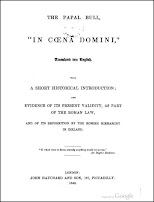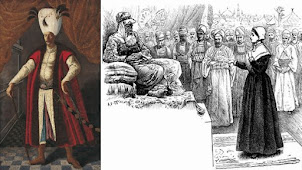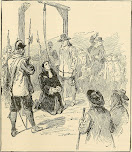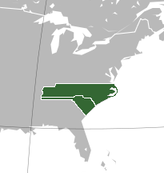These short contributions to the ecclesiastical history of America, which can still be completed by many others, certainly show most clearly how in earlier years religious intolerance ruled and tyrannized even in this country. Only our present Constitution put an end to this legislature in church matters, to the abominable oppression of consciences, and to the manifold punishments for the sake of faith! Only a blind zealot for his supposedly "true" religion can wish for those times to return. Praise be to God for the freedom He has given us; may He preserve it for us in grace and make us vigilant and courageous so that we do not let ourselves be robbed of it or carelessly lose it.
"A bishop, as a bishop, has no power to interpret to his churches some statute or ceremony, without the consent of the churches in plain words, or by implication. Because the church is free and a ruler (woman ruler), and the bishops may not rule over the faith of the churches, nor complain and harass them against their will. For they are only servants and stewards, not masters of the churches. But if the church, as one body, agrees with the bishop, they may impose upon each other what they will, if only godliness does not suffer thereby; they may also again leave such things as they please." (Luther.) <p. 33>
————————
On the temporal power of the popes
already [Pope] Nicholas I (858-867) said: "The Roman See judges which belong to the godless princes and which do not." (Protest. Resp., p. 259.)
[Pope] Gregory VII (1073-1085) declared: "Without the confirmation of the Pope, no civil and no canonical (ecclesiastical) code has validity. The pope alone has the right to use the imperial ornaments, to him alone are the secular princes indebted to kiss the feet, and to him alone is the dispensation of emperors and kings from their dignity, and the absolving of subjects from the oath they have taken." (Protest. Resp., p. 259.)
The Jesuit Antonius Santarelli (1625) says: "The pope may appoint guardians for princes, punish them, and depose them himself for heresy, incapacity, negligence, or any other cause. He can not only do everything that the temporal princes can do, but also has the power to dispose of their states in favor of others." (Protest. Reply, p. 259.)
And the Papist Staudenmaier says: "Emperors, kings, and princes are only through the Pope, because he is of God. Princes, therefore, must obey, everything must obey, because the pope is in God's stead." (Protest. Resp., p. 260.)
In the so-called Lord’s Supper Bull [“Nachtmahlsbulle” or In Coena Domini, “] (which six popes have so perfected that it appears a veritable spawn of hell) article 5 curses all those princes "who impose and increase new levies in their countries, except in such cases as are granted them by special permission of the apostolic see." (Protest. Resp., p. 260.)
Still in recent times a Catholic wrote:
"In order to bend the peoples under the yoke of one faith, the Papacy is suppressing their unity and independence in worldly matters. It entertained the Reaction of the Vendee (in France), originated the Civil War in Spain [ref. Carlist Wars], hatched the Sonderbund in Switzerland, incited the Rhineland against Prussia, the Irish against England, the Catholics of Baden against its… government [Kulturkampf], and tore Austria into disastrous parties by the Concordat [of 1855]."
On the Jesuits
already in 1611 the learned Servite monk Paolo Sarpi said: "Nothing is more important than to destroy the reputation of the Jesuits. If they are overthrown, Rome will fall, and if Rome is lost, religion will renew itself" (because then the Bible will be read and the Gospel preached).
Peter the Great (Emperor of Russia from 1682 to 1725) spoke of the same order: "I know that the Jesuits use religion only for their personal advantage, that this appearance of piety conceals an intemperate ambition and an intricate engine for intrigues, the game of which is only to increase their wealth and to establish or fortify the rule of the pope, or rather their own, in all the states of Europe; — that their schools are but the instruments of tyranny, — that they are too great enemies to tranquility to be hoped that they would not interfere in the affairs of my empire. I marvel that there are still courts in Europe whose eyes are not opened to them and to their deceitful conduct."
And Joseph II (Emperor of Germany from 1765 to 1790) said of this godless mob in July, 1773: "The Jesuits brought upon Germany the calamity of the Thirty Years' War, — by their principles snatched the throne and life from Henry IV (of France); they were the authors of the appalling revocation of the Edict of Nantes."















![Lord Granville [John Carteret] Lord Granville [John Carteret]](https://blogger.googleusercontent.com/img/a/AVvXsEg-g7sfIlUQwigIWitnQPss8jzACexZ7sSRA6j8U19Wptp_M3sWxZRXnb9PIexXjHJfNIMWLJ94ngmCR58xhnLewFMBr9Du6Y_laplyjn4LkrgBX4SDt5936RBT30Gs3536Lkr-SlAuoMHWe36gTwC0qHc3JM7jxRACm_b04NBWFCYGfWjYrmaPBsk=w115-h147)

